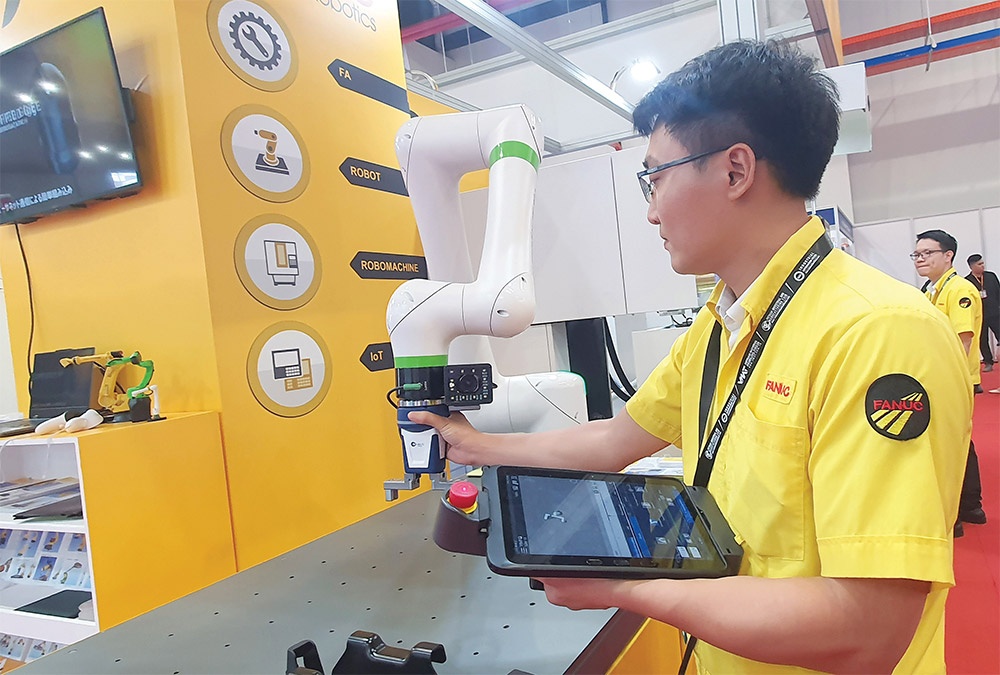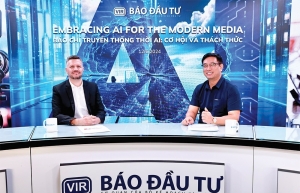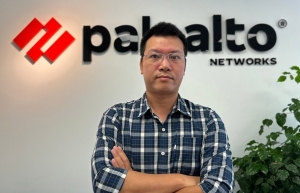Time is now for Vietnam to fully cultivate AI talent
During a seminar with South Korean experts and scientists in AI last week in South Korea, Vietnam’s Prime Minister Pham Minh Chinh expressed his desire for them to share their knowledge and experiences to help Vietnam’s AI sector develop rapidly and sustainably.
“Developing science, technology, and innovation is an objective requirement and a global trend. Along with promoting the development of the green economy, digital economy, circular economy, and sharing economy, Vietnam is determined to focus on developing high-value sectors, especially emerging fields at the moment, like AI,” PM Chinh stated.
 |
In its 2024 report evaluating the AI Readiness Index of 125 countries, the International Monetary Fund places Vietnam among the emerging countries that have not yet been immediately impacted by AI as developed nations have, with high exposure – high complementary and high exposure – low complementary rates about 40 per cent.
While Vietnamese businesses have envisioned the application of AI since the mid-2000s, Vietnam currently has a significant advantage in AI development, according to Nguyen Quang Huy, director of data engineering at Techcombank.
“This advantage is bolstered by the return of a highly-skilled workforce, including experts and students trained and practised in AI abroad, due to the pandemic and political instability overseas. When global economic and political trends are volatile, the stable development environment in Vietnam becomes highly attractive to high-tech talent, not only among Vietnamese professionals but also international experts,” Huy said.
The Vietnam Software and IT Services Association said at PM Chinh’s conference in April on promoting economic diplomacy that Vietnam currently has one million IT engineers, nearly half of whom are ready to transition to the fields of AI and semiconductors.
The association added that Vietnam is holding a distinct advantage with a ready pool of high-quality software engineers who can be further trained in AI to develop AI applications. These applications can be used to automate processes in businesses and manufacturing, thereby increasing productivity and efficiency.
Recognising AI’s potential to drive economic growth, the government has implemented supportive policies like the national strategy on research and development (R&D) and application of AI, enhancing the application of AI in daily life.
Companies like Viettel Cybersecurity, FPT.AI, VinAI Research, and Neurond AI are at the forefront of developing innovative AI solutions across various sectors, including healthcare, finance, and logistics. In May, FPT.AI was named Outstanding Virtual Assistant 2023 by Software Reviews, an Info-Tech Research Group member, recognising FPT.AI’s efforts over the past year in partnering with enterprises to create value in AI.
Meanwhile, it is crucial to prepare for the rapid and significant impacts AI will bring, said Pham Thanh Hai, CEO of JobsGO. “The time for AI to explode in Vietnam has arrived. However, some challenges persist in fully developing Vietnam’s AI talents. A major issue is the shortage of skilled professionals, compounded by a lack of comprehensive educational programmes tailored to the AI industry’s evolving needs. The qualifications of many graduates do not align with industry requirements, creating a talent gap that could impede the country’s AI ambitions,” said Hai.
“In terms of the AI engineering workforce, Vietnam lacks a competitive edge in deep research to build and train core models due to both talent shortages and financial constraints, training new models currently costs several hundreds of millions of US dollars each time. However, Vietnam stands to benefit in building AI products and applying AI within enterprises, automating processes, leveraging its pool of nearly 500,000 high-quality programmers, and a strong digital transformation movement. Vietnam may well pioneer a new trend of enterprise AI adoption,” added Hai.
To effectively nurture its AI talent to drive future innovations, there are suggestions for Vietnam to focus on enhancing its educational programmes. “The solution is now to provide continuous learning to the AI workforce, which means it does not stop at school, but also takes place in workplaces,” said Huy of Techcombank. “Furthermore, there is a need to ensure that our engineers are equipped with not only the good theory foundation, but also the practical skills necessary to apply AI to solving real-world problems. Organising AI competitions and hackathons can stimulate creativity and problem-solving among students and professionals.”
The country’s IT workforce, including over 400,000 professionals, is increasingly involved in AI-related fields such as data science and software development. This robust foundation has garnered significant investor interest, with projections indicating that Vietnam’s digital economy could reach $43 billion by 2025, largely fuelled by advancements in AI technology, said Dr. Andy Le, AI expert at the Nanyang Technological University Alumni.
“Strengthening industry-academia collaboration is crucial. By fostering partnerships between tech companies and universities, Vietnam can ensure that academic training aligns with industry needs. Joint R&D projects and internships can facilitate knowledge transfer and innovation, giving students practical experience and exposure to real-world AI challenges,” said Le.
Addressing talent gaps and promoting inclusivity in AI education are crucial, he added. “Focusing on skill development for high-demand areas such as AI engineering and data science will help bridge the talent gap. Ensuring that AI education and training programmes are accessible to a diverse range of students, including those from underrepresented groups, will create a more inclusive and robust AI talent pool,” he said.
| Tran Hai Linh, founder, Sendo
Vietnam boasts a significant young IT professional workforce, marked by enthusiasm and aptitude for learning new technologies. This demographic is a vital asset, as they are well-positioned to absorb and implement cutting-edge advancements in AI and other technological fields. The country is witnessing rapid growth in its technology industry, with numerous startups emerging to capture and shape new trends. This vibrant entrepreneurial ecosystem is crucial for fostering innovation and driving the development of AI solutions that meet both local and global needs. AI represents a relatively nascent field that offers a level playing field for nations worldwide. For Vietnam, this is an excellent opportunity to establish itself as a competitive player by focusing on AI applications and engineering. Leveraging the technical skills and innovative spirit of its workforce can significantly propel the country forward in this industry. The Vietnamese government has made commendable strides in supporting the technology sector, particularly AI. Initiatives to encourage this burgeoning industry are essential, yet there is room for further enhancement. Increased investment in R&D will be pivotal in fostering groundbreaking AI technologies. Additionally, creating an attractive environment for world-leading companies to invest in Vietnam can provide invaluable resources, expertise, and global market access. These two pivots would help nurture a robust AI workforce for the country. Nguyen Van Quy, technical director of Data & AI KiotViet
The current high-quality labour force in Vietnam in 2022-2024 shows a robust and growing labour market. Labour in industrial and key economic regions remained stable in 2023, recovering from the massive lay-offs at the end of 2022. The workforce is relatively young, intelligent, and belongs largely to Gen-Z and Millennials who want to engage fully in the business process and make a significant contribution to their value, company and society. In the field of AI, many talented people have been attracted in recent years. Many foreign companies have opened offices in Vietnam to make use of this potential at a high level of compensation. This is closely related to the practice of implementing AI in Vietnam. It includes several strategic actions in line with the increasing focus on technological innovation. Many initiatives reflect Vietnam’s commitment to using AI as a catalyst for innovation and growth in various industries. For example, AI-powered robotics and automation systems are transforming the manufacturing sector, and many fintech companies are using AI for fraud detection and risk assessment. Integration of AI algorithms and models from design to testing in software development to improve efficiency and accuracy. To effectively train and develop AI talent, developing a comprehensive university-level AI training initiative to overcome the skills gap is required. In addition, companies and universities should cooperate more widely to achieve more effective cooperation. There should be more practical spaces and real-world problems to help bring AI projects from the lab to the industry/business environment, which allows AI personnel in Vietnam to practice and delve deeper, thereby fostering sustainable development. Partnering with AI professionals or academic institutions to gain technical expertise is also needed. The training can be integrated with top regional universities to provide opportunities for international exchange and training for Vietnamese personnel and students. |
 | Firms should focus on Gen Z for AI boost As AI and its applications expand across various industries, Gen Z, being the first generation to be reared on social media and handheld electronic devices, is seen as the key to enhancing the competitiveness of businesses in the new economy. |
 | New AI offerings pose more questions The AI explosion is continuing at pace with new offerings from the biggest tech groups in the world, but ethical concerns and investing considerations are taking up more focus as industries like the media and manufacturing adjust their priorities. |
 | Redefining the journalism landscape in the age of AI With the recent rise of AI, some journalists and media agencies are fearing an invasion where their journalistic work is used (sometimes without permission) as sources to generate personalised content, or to support social media users in their own quest to become opinion leaders. |
 | AI-powered solutions to be adequate response to threats Toying around with the latest generative AI tools has been entertaining for many. Yet, AI has long transcended personal use, profoundly reshaping organisational and business activities. |
What the stars mean:
★ Poor ★ ★ Promising ★★★ Good ★★★★ Very good ★★★★★ Exceptional
Related Contents
Latest News
More News
- Masan Consumer names new deputy CEO to drive foods and beverages growth (February 23, 2026 | 20:52)
- Myriad risks ahead, but ones Vietnam can confront (February 20, 2026 | 15:02)
- Vietnam making the leap into AI and semiconductors (February 20, 2026 | 09:37)
- Funding must be activated for semiconductor success (February 20, 2026 | 09:20)
- Resilience as new benchmark for smarter infrastructure (February 19, 2026 | 20:35)
- A golden time to shine within ASEAN (February 19, 2026 | 20:22)
- Vietnam’s pivotal year for advancing sustainability (February 19, 2026 | 08:44)
- Strengthening the core role of industry and trade (February 19, 2026 | 08:35)
- Future orientations for healthcare improvements (February 19, 2026 | 08:29)
- Infrastructure orientations suitable for a new chapter (February 19, 2026 | 08:15)



 Tag:
Tag:

















 Mobile Version
Mobile Version